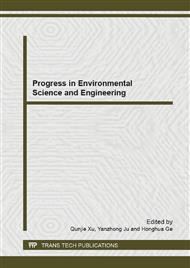[1]
Lv Lianhong, Luo Hong. Air quality in China and new ideas for controlling pollution [J]. Energy of China, 2012, 34(1): 18-20.(in Chinese)
Google Scholar
[2]
Yun Yaru,Chai Fahe,Wang Shulan, et al. General review of European acid rain control programs and effects [J]. Research of Environmental Sciences, 2010, 23(11): 1361-1367.(in Chinese)
Google Scholar
[3]
Zhang Jianyu, Pan Li, Yang Fan, et al. Study on current status of air pollution control for coal-fired power plants in China [J]. Journal of Environmental Engineering Technology, 2011, 1(3): 185-196.(in Chinese)
Google Scholar
[4]
Ma Shijun, Wang Rusong. The Social - Economic - Natural complex ecosystem [J]. Acta Ecologica Sinica, 1984, 4 (1): 1-9.(in Chinese)
Google Scholar
[5]
Qin Shusheng. Analysis on characteristics of compound ecosystem of self-organization [J], Journal of Systems Science, 2008, 16 (2): 45-49.(in Chinese)
Google Scholar
[6]
Li Bin, Zhang Xiangshu. The environmental impact of the evolution of complex ecosystem [J]. Environment and Sustainable Development, 2009, (2): 27-29.(in Chinese)
Google Scholar
[7]
Lv Lianhong, Zhang Zheng, Li Daofeng, et al. Application of Analytic Hierarchy Process to construct the ecological environment quality assessment index system in Chinese coal city [J]. Energy Environmental Protection, 2005, 19 (5): 53-56.(in Chinese)
Google Scholar
[8]
Lv Lianhong, Luo Hong, Lu Chaojun. Empirical research on early warning index system for sudden water pollution accident [J]. China Safety Science Journal, 2010, 20 (4): 148-154.(in Chinese)
Google Scholar
[9]
Ding Mei, Ji Chunlei, Zou Biying, et al. Comprehensive assessment of biomass energy developing program for Jiangsu province based on AHP method [J]. China Biogas, 2011, 29 (4): 36-40.(in Chinese)
Google Scholar
[10]
Jia Yanhong, Zhao Jun, Nan Zhongren. The application of Entropy-right method to the study of ecological security evaluation of grassland——A case study at the ecological security evaluation of grassland to pastoral area of Gansu [J]. Journal of Arid Land Resources and Environment, 2007, 27 (1): 17-21.(in Chinese)
Google Scholar
[11]
Hu Biyu, Hu Changsheng, Guo Junjun, et al. An Entropy weight approach on the synthetic assessment of the Northern Sichuan urban ecosystem health [J]. Research of Soil and Water Conservation, 2010, 17 (6): 158-162.(in Chinese)
Google Scholar
[12]
Wei Yongdong, Wen Xuefei, Ma Fengmao, et al. The intensive utilization evaluation of arable land in Yanchi county, Ningxia based on Entropy value method [J]. Chinese Agricultural Science Bulletin, 2011, 27 (32): 216-220.(in Chinese)
Google Scholar
[13]
Yu Lijuan. Study on land use benefits appraisal of Shuangliu county [D]. Sichuan: Sichuan Agricultural University, 2006, 9-11.(in Chinese)
Google Scholar


